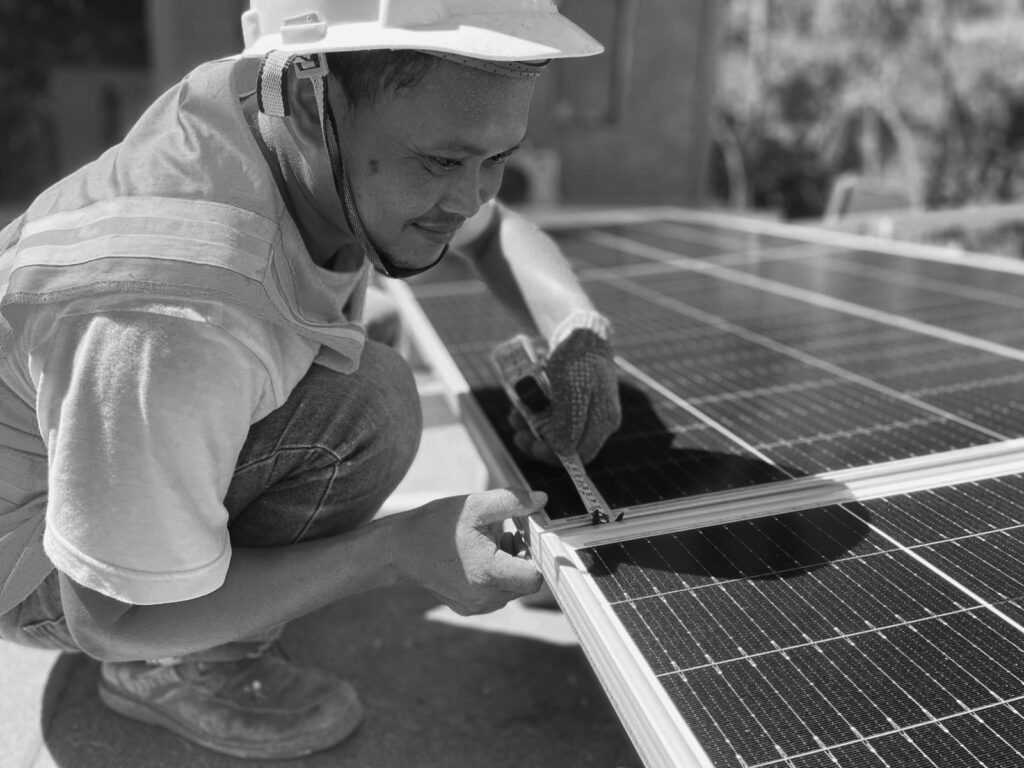
THE PUNCH RESOURCES
How solar energy works and
Indonesia's Solar Potential
Bali, Indonesia – November 7, 2023
In an age where environmental sustainability and renewable energy sources are gaining importance, solar energy stands out as a shining star. Solar power is an abundant, clean, and sustainable source of energy that has the potential to transform the way we power our homes, businesses, and even entire cities.
Solar energy is the energy harnessed from the sun’s rays. It is a renewable resource, meaning it won’t run out as long as the sun continues to shine, which is expected for billions of years. The key to harnessing this energy is solar photovoltaic (PV) technology, which converts sunlight into electricity. There are two main components involved in this process: solar panels and inverters. These solar panels, composed of numerous solar cells, capture sunlight and generate direct current (DC) electricity when photons from the sun interact with them. The inverters, on the other hand, play a crucial role by converting the DC electricity into alternating current (AC) electricity, which is what our homes and appliances run on. Together, these components make solar energy a practical and eco-friendly choice for meeting our energy needs.
In many cases, solar systems are connected to the electrical grid. Excess electricity generated by your solar panels can be fed back into the grid, and you may receive credits on your electricity bill through a system called net metering. This allows you to offset your energy consumption when the sun is not shining, such as during the night or on cloudy days.
Solar power systems play a crucial role in reducing your carbon footprint and helping mitigate the adverse effects of climate change.
Clean and Green Energy Source
Solar energy is widely recognized as one of the cleanest and most environmentally friendly energy sources available. When you harness energy from the sun, there are no harmful emissions of pollutants or greenhouse gases. Solar power systems generate electricity silently and without contributing to air or water pollution, making it a planet-friendly choice that helps combat climate change.
Significant Long-term Savings
Although the upfront cost of installing a solar power system may seem like an investment, it pays off in the long run. Solar energy can lead to substantial savings on your electricity bills. By generating your electricity, you can reduce or even eliminate your reliance on traditional power sources, and sometimes even earn money by selling excess electricity back to the grid. Over time, the cost savings can be quite significant, making solar power a smart financial decision.
Energy Independence
Solar energy reduces your dependence on fossil fuels. Instead of relying on non-renewable resources like coal, natural gas, or oil, you generate your electricity from the sun. This not only reduces your reliance on often unpredictable energy markets but also enhances your energy independence. You have more control over your energy production and consumption, providing peace of mind in times of energy shortages or price fluctuations.
Minimal Maintenance
Solar panels are remarkably low-maintenance. Once they are installed, they require minimal attention. The occasional cleaning to remove dirt and debris and a routine inspection to ensure everything is functioning correctly are typically all that’s needed. This minimal maintenance makes solar energy systems an attractive option for those who want to save on energy costs without the hassle of frequent upkeep.
Positive Environmental Impact
By choosing to harness solar energy, you’re not just benefiting your own financial well-being; you’re also contributing to a cleaner and greener future for the planet. Solar power systems play a crucial role in reducing your carbon footprint and helping mitigate the adverse effects of climate change. By embracing solar energy, you’re part of the solution in the global effort to transition towards a more sustainable and eco-friendly energy landscape.

Located at the equator, Indonesia’s solar potential is the highest of all renewable sources.
What are the challenges and potential of solar energy in Indonesia?
Located at the equator, Indonesia’s solar potential is the highest of all renewable sources. But there are some challenges in adopting solar technology in Indonesia. According to Anthony Utomo, Deputy Chairperson of the Indonesian Solar Energy Association (AESI), Indonesia faces two main challenges in adopting solar PV technology. First, there is a need to educate users (customers) about solar PV to increase their readiness to embrace this technology. This effort aligns with the National Energy Master Plan (RUEN) 2017, which aims to reduce energy intensity. The plan encourages the use of solar PV in 30% of government buildings, 25% of luxury homes, and downstream industrial applications. Second, there is a need to enhance the skills and competencies of personnel responsible for installing solar PV systems and developing the electrical infrastructure for solar power plants. This includes supporting small businesses and entrepreneurs (solar preneurs or green MSMEs) in all regions to take part in the growing trend of rooftop solar PV usage.

These solar energy solution partners play a pivotal role in facilitating the transition towards sustainable and cost-effective solar power in Indonesia.
Trusted Solar Suppliers in Bali, Indonesia
In addressing Indonesia’s dual challenges in promoting solar PV adoption, companies like Ineco Solar, Nusa Solar, and Smart Tech Energy have emerged as crucial allies. These entities specialize in providing solar energy solutions, making them instrumental in overcoming the hurdles of user education and building solar PV installation competencies. These solar energy solution partners play a pivotal role in facilitating the transition towards sustainable and cost-effective solar power in Indonesia. Their expertise and services empower businesses and individuals to harness the abundant solar potential in the region, making solar energy a practical and accessible choice for a brighter and cleaner future.

EXPLORE THE PUNCH

